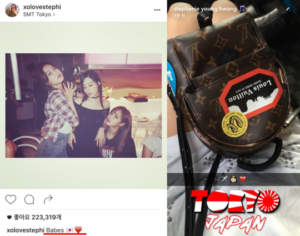 On August 15, SNSD‘s Tiffany got into a scandal that is being discussed in a fervent manner, not just in South Korea, but amongst international fans as well. After an SM Town concert in Tokyo, Tiffany uploaded an Instagram post with the caption “Babes” with the Japanese flag and a heart emoji. She then uploaded a second post, this time on Snapchat, with a Tokyo, Japan sticker with the Rising Sun flag incorporated into the design.
On August 15, SNSD‘s Tiffany got into a scandal that is being discussed in a fervent manner, not just in South Korea, but amongst international fans as well. After an SM Town concert in Tokyo, Tiffany uploaded an Instagram post with the caption “Babes” with the Japanese flag and a heart emoji. She then uploaded a second post, this time on Snapchat, with a Tokyo, Japan sticker with the Rising Sun flag incorporated into the design.
There are two problems here. The first is that August 15 is the National Liberation Day of Korea. This is a holiday celebrated in both Koreas, and commemorates the day Japan surrendered to the Allied Forces, putting an end to World War II in the Pacific. The second problem is the Rising Sun flag used. On any other day, it would still be an issue due to the problematic history of the flag. But on August 15 itself? Of course it became a controversy of epic proportions.
Since the scandal exploded, Tiffany has been a hot topic not just amongst Korean netizens, but amongst international fans as well. While Koreans have been generally calling for Tiffany to be booted from Sister’s Slam Dunk (with producers acquiescing) and, in typical K-netz fashion, wanting her out of the industry or at the very least, SNSD, the international response has been of a different tone. While a good percentage of the international fandom understands the implication of the Rising Sun flag and why it is such a despised image in Asia, especially in Southeast Asia and East Asia, there is still an alarming number of fans writing the scandal off as an over-reaction.
Which brings us to the point: the main reason for the netizens fury is that Tiffany — a member of one of the most popular Korean girl groups ever, having been active in the industry for almost a decade and having lived in South Korea for even longer — has committed one of the biggest faux pas a Korean could ever have made on Liberation Day: on the very day that celebrates the day Japan surrendered, instead of showing her nationalistic pride, she goes and uploads on her SNS a post that also has the war flag of the Imperial Japanese Army.
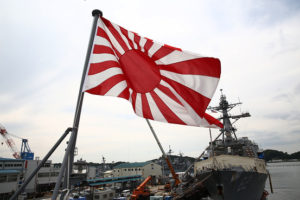 It is, simply put, one of the worst things any public figure could have ever done on that day.
It is, simply put, one of the worst things any public figure could have ever done on that day.
So, why is it that the Rising Sun Flag, a flag still in use by the Japanese Navy today, is so despised? What significance does the Rising Sun Flag have? Why is it that South Korea and Japan have such strained relations to the point that it impacts K-pop? To get to the core of why Tiffany is being dragged to hell and back in South Korea, one must first know the answers to these questions. And like most issues regarding Japan and any of its Asian’s neighbors, one must first trace all the way back in history to fully comprehend the complexities of Japan’s relations with…well, basically everyone.
A quote from The New York Times highlights just how much the history of the region matters, and why every little advertisement of Japan on just about any day is called into question:
The real source of all this bitterness, of course, and the reason it’s so hard to resolve, is that it actually has little to do with the [Diaoyu/Senkaku and Liancourt] islands themselves, or with various other pretexts….what’s really at stake is the legacy of what happened in the region during the first half of the 20th century. That’s when a rapidly modernizing Japan set out to establish itself against the imperial European powers by brutally carving out and exploiting an empire of its own in Korea, Northern China and elsewhere.
Seventy-plus years later, those events still rankle, and turn small problems into big ones.
Of course, while there is a huge convoluted history of Japan and Korea relations that cover over a thousand years as the two countries have interacted with each other in “ethnic, cultural, political, and economic exchanges,” the main reason relations are so strained is due to the ‘legacy’ that is mentioned above. This, of course, refers to the role of Japan in the Second World War, and the crimes against humanity committed by the Japanese.
Japan and the Axis Powers: World War II in the Pacific
While one could start from the time Japan was forced to open its ports to the world due to pressure from the United States via the Perry Expedition as to explain why Japan so loathed to be ruled by another power, I would rather start with the acts that initiated the antipathy of the Western powers towards Japan. Emboldened by their triumphant defeat of Russia during the Russo-Japanese War of 1904-1905, Japan saw that they had no rivals for influence over the Korean peninsula. The Treaty of Portsmouth not only ended the war, but also saw Russia giving up their interest in Korea. Despite having no signature from the Korean emperor, and attempts by the emperor to gain an audience with the more powerful Western nations, the Japan-Korea Treaty of 1905 effectively brought Korea under Japanese rule.
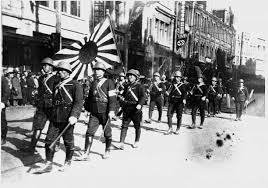 Japan then invaded Manchuria, a region bordered by China, Mongolia and Russia, and one of dispute between those three countries. Japan also saw Manchuria as their prize from the Russians and succeeded in their invasion in 1931; they established the puppet state of Manchukuo, installing Henry Puyi, the last Emperor of China, as its Head of State.
Japan then invaded Manchuria, a region bordered by China, Mongolia and Russia, and one of dispute between those three countries. Japan also saw Manchuria as their prize from the Russians and succeeded in their invasion in 1931; they established the puppet state of Manchukuo, installing Henry Puyi, the last Emperor of China, as its Head of State.
This shocked the world, and in fact, signaled that the League of Nations, the predecessor to the United Nations and created after the First World War to prevent another, had no power over nations if a strong nation wished to pursue an aggressive foreign policy. With the League of Nations not having stopped the invasion, this also confirmed the suspicions of Adolf Hitler and Benito Mussolini that the League of Nations would not be able to stop them either. And three years later, Italy would start the Second Italo-Ethiopian War and Hitler would invade Poland and Czechoslovakia. In 1936, Nazi Germany and the Empire of Japan would sign the Anti-Comintern Pact, which Italy would also later sign, thus indicating the formation of the Axis Powers.
This all came into being in December 1941 when Japan invaded Thailand, attacked the British occupied territories of Malaya (now part of Malaysia), Singapore and Hong Kong, and the US bases in Guam, the Philippines and, probably most famously, Pearl Harbor in Hawaii.
War Crimes and Crimes Against Humanity
(NB: text and links in the following section contain information and imagery that may be distressing)
The acts of Japan during the Second World War and throughout their 35 year rule over the peninsula is what truly strains relations between Japan and South Korea. It was also during the Second World War where the reputation of the Japanese army had changed for the worst. During the Russo-Japanese War, the Japanese had treated the defeated with courtesy, but it was a different case this time.
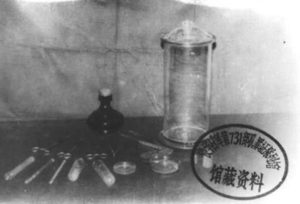 The war crimes committed by Japan were widespread and knew no nationality, nor respected any of the international agreements on the treatment of Prisoners of War. The Geneva Conventions and The Hague Conventions were routinely ignored and civilians and hospitals routinely came under fire.
The war crimes committed by Japan were widespread and knew no nationality, nor respected any of the international agreements on the treatment of Prisoners of War. The Geneva Conventions and The Hague Conventions were routinely ignored and civilians and hospitals routinely came under fire.
Examples of their war crimes include the Bataan Death March which saw 70,000-80,000 POWs from the Philippines and the United States march approximately 66 miles without food or water given, and those that did not get up in the morning were killed. There is also the famous Nanjing Massacre or Rape of Nanjing, where for over a week the Japanese fired upon and raped the Chinese. There are also the numerous accounts of summary killings of POWs at numerous camps, the murder and cannibalism as attested by Australians (Kokoda Track) and Americans, attacking neutral nations, mass killings including civilians, torture of POWs, and countless more.
The Koreans were one of those forced into labour and slavery. There is an estimated almost 58,000 Koreans who were forced into labor to make the warships, weapons, and military supplies of the Japanese. While the Japanese routinely denied the allegations of using forced labor, they finally acknowledged the use of Korean forced laborers in building 7 of 23 newly declared UNESCO World Heritage Sites in 2015.
There is also the infamous Unit 731 of the Japanese Imperial Army, dedicated to biological and chemical warfare and conducting human experimentation. An estimate of up to 250,000 people were experimented on, most, with some estimating 70% of those experimented on as being Chinese and Korean. The male and female prisoners, referred to as ‘logs,’
were subjected to vivisection without anaesthesia after they had been deliberately infected with diseases such as typhus and cholera. Some had limbs amputated or organs removed.
Leading members of the unit were secretly granted immunity from prosecution in return for giving US occupation forces access to years of biological warfare research. Some went on to occupy prestigious positions in the pharmaceutical industry, health ministry and academia.
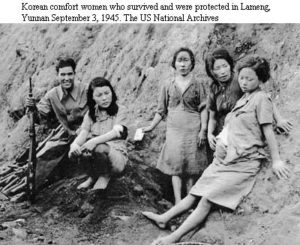 There are also numerous reports of the women being raped by guards, staff and the doctors, as well as forced pregnancies after infecting the woman with diseases. This was done to see if the born child would also have the disease. The prisoners were also forced to have sex with one another, at the threat of a gun, to study if syphilis would be spread. They would then be vivisected at various stages of the infection to see how it progressed and affected the internal and external organs of the prisoner. Male prisoners were also raped and mutilated.
There are also numerous reports of the women being raped by guards, staff and the doctors, as well as forced pregnancies after infecting the woman with diseases. This was done to see if the born child would also have the disease. The prisoners were also forced to have sex with one another, at the threat of a gun, to study if syphilis would be spread. They would then be vivisected at various stages of the infection to see how it progressed and affected the internal and external organs of the prisoner. Male prisoners were also raped and mutilated.
Of course, the most talked about is the issue of comfort women. An estimated 200,000, and even more, were forced into sexual slavery. While at first prostitutes indeed were recruited to become comfort women, it rapidly became a situation where girls from poor families were taken by other means. In some instances, it would be through false advertising. In others, the girls were abducted from their homes and forced into sexual slavery. Once in the military station, they would be forced to service 30 to 40 men a day.
There are reports that some military men paid, although most went to the upkeep of the women rather to the women themselves. The prettiest ones would be kept separate from the rest and only available to the higher ranking Japanese soldiers. Some would later be relocated to Unit 731 and forced to endure the horrors there. A majority of those taken and forced into becoming comfort women were between the ages 13 to 16.
It all ended when Japan surrendered. Only 46 former South Korean comfort women are alive today, and many are in their 80s and 90s.
After the war, war tribunals were held. While Japan has been charged for war crimes, there are several which Japan refuse to not only admit to, but refuse to give official apologies, despite evidence, choosing instead to proclaim these war crimes as fabrications.
Korea and Japan Today
2015 may have marked the 50th anniversary since the signing of the 1965 Japan-South Korea Normalization of Diplomatic Relations, but the issues that plague the two countries continue.
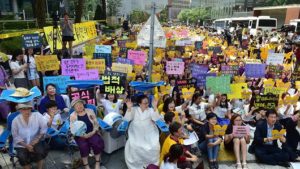 One of these is the issue of the Liancourt Rocks, otherwise known as Dokdo in Korea and Takeshima in Japan. The issue of the island is one that has been covered before, and one that has the most impact on Hallyu in Japan. In 2005, Japan established Takeshima Day to celebrate 100 years of their occupying the contested territory. In 2010, then-President Lee Myung-bak visited Dokdo and asked the Japanese for an official apology for the crimes they committed during the Second World War.
One of these is the issue of the Liancourt Rocks, otherwise known as Dokdo in Korea and Takeshima in Japan. The issue of the island is one that has been covered before, and one that has the most impact on Hallyu in Japan. In 2005, Japan established Takeshima Day to celebrate 100 years of their occupying the contested territory. In 2010, then-President Lee Myung-bak visited Dokdo and asked the Japanese for an official apology for the crimes they committed during the Second World War.
The response of the Japanese is practically the same every time the South Korean President asks for an apology: they recall their Japanese Ambassador residing in Seoul. In diplomatic terms, this is seen as the country telling the other that they have done something wrong — in the eyes of Japan, South Korea did them wrong by asking to go to the contested area and then asking for that apology. It is a serious move and the decision to recall one’s ambassador is not one to be taken lightly.
Another issue that continues to plague the two countries is that of the comfort women. In 2011, a South Korean constitutional court found that the South Korean government had not done enough to find compensation from Japan on behalf of South Korean comfort women and forced laborers from the 35-year occupation. In December 28, 2015, the foreign ministers of Japan and South Korea reached an agreement that sought to end the issue once and for all. It saw the Japanese agreeing
that atrocities were committed with the “involvement” of the Japanese Imperial army and acknowledges the resulting dishonor to Korean women. Prime Minister Shinzo Abe expressed his “most sincere apologies and remorse to all the women who underwent immeasurable and painful experiences.”
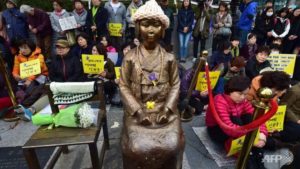 In return, the South Korean foreign minister promised to find a solution to taking down the comfort woman statue in front of the Japanese Embassy, and putting everything behind them. While the agreement is done, it has reached no implementation, partially due to the politics of their leaders. In Japan, Prime Minister Abe continues the tradition of Japanese politicians casting doubt over the issue, saying that there is no evidence that the Japanese military indeed forced women into sexual slavery, or that they committed any war crimes in general.
In return, the South Korean foreign minister promised to find a solution to taking down the comfort woman statue in front of the Japanese Embassy, and putting everything behind them. While the agreement is done, it has reached no implementation, partially due to the politics of their leaders. In Japan, Prime Minister Abe continues the tradition of Japanese politicians casting doubt over the issue, saying that there is no evidence that the Japanese military indeed forced women into sexual slavery, or that they committed any war crimes in general.
Meanwhile, in Korea, opinion polls show that half oppose the agreement and more than half oppose to removal of the statue. President Park Geun-hye’s Saneuri Party also lost their majority in the legislative house, and the opposition parties that either opposed the agreement or wished for a renegotiation both gained seats. Many feel that the apology given by the Prime Minister was inadequate because the apology did not recognize the role of the Japanese government in the establishing and maintaining a system that allowed forced sexual slavery to continue.
This means that the issue will continue to be debated about, and while that is the case, the relations between Japan and South Korea will not normalize to the levels of France and Germany — while France also suffered heavily from Nazi Germany, the two countries are seen as jointly influential in Europe and, in fact, were instrumental in the creation of the European Union.
At the heart of Tiffany’s controversy is the usage of the Snapchat filter with the Rising Sun Flag as a center proponent of the design. While all the war crimes were committed, the people would not see the normal Japanese flag, but rather the flag of the Imperial Japanese Army, causing a resentment that continues to this day. This is exacerbated by perceived reluctance from Japan to give what would be an acceptable apology. The heavy history between Japan and Korea is part of the nationalist identity of South Korea.
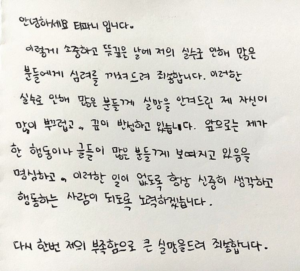 And no, to say that she must have not known because she was raised and educated in America is not a valid excuse. Not only did her fans tell her prior on a previous post, but she has lived in South Korea for more than a decade. Given how South Korea celebrates National Liberation Day due to its significance to them, it would be hard to believe that she did not know that the Rising Sun Flag is a big no-no.
And no, to say that she must have not known because she was raised and educated in America is not a valid excuse. Not only did her fans tell her prior on a previous post, but she has lived in South Korea for more than a decade. Given how South Korea celebrates National Liberation Day due to its significance to them, it would be hard to believe that she did not know that the Rising Sun Flag is a big no-no.
Other idols have come under fire for smaller offenses, but this is one of the biggest one can commit. She doesn’t have to know the history, she just needs to know that this flag in particular, especially on such a huge holiday, is unacceptable. After living in a country for more than a decade, it should be common sense. She has been a member of one of the most popular female groups in that country. Not only that, but SNSD has had a similar issue before during the “Genie” era with Japanese kamikaze planes on the cover.
With that being said, she does not deserve the amount of hate that she is getting. She does deserve the criticism, but not the death threats, comments about her late mother, or being blamed for South Korean losses in the Olympics. While she did something bad, it does not amount to death threats, be them made off-handedly or in a joking manner. These comments, along with those about her late mother, are abusive in their intent, takes what is happening and blows it out of proportion. Unfortunately, online death threats being illegal is still being debated and no international standard has been created.
Since the issue has exploded, Tiffany has apologized for her posts. Despite this, she is still being criticized for her lack of common sense regarding the main issue, as well as the perceived lack of genuine apology due to the dryness of the one she posted. Many continue to call for her to either leave South Korea or to retire, and it is not surprising that her fans continue to defend her actions. It is easy to see that this will not be an easy controversy to escape from, and repercussions will continue.
What about you, readers? Has this helped explain why the rising sun flag is such a controversial symbol? What is your take on the controversy, and how do you imagine Tiffany, SNSD, and SM Entertainment will fare in the days and months to come? Sound out in the comments below!
(Council for Foreign Relations [1][2], The New York Times [1][2], The Wall Street Journal [1][2], The Diplomat [1][2], Britannica, The Atlantic [1][2], BBC [1], The Guardian [1], Huffington Post [1], The Telegraph [1], The New World of International Relations, 7th Edition; Michael G. Roskin and Nicholas O. Berry; 2004, World Politics in the 21st Century; Duncan, N.; 2008,; Peace and War: United States Foreign Policy, 1931-1941 (Washington, D.C.: U.S., Government Printing Office, 1943), The Deepest Circle of Hell: Sex Crimes Propagated at Unit 731 During the Pacific War (1941-1945), Kiersten Strachan,; 2015,; History.com, Naver [1][2], Nate, FNNews; Images via Getty Images, The Atlantic, European Pressphoto Agency, AFP, SM Entertainment, Instagram, Snapchat)


